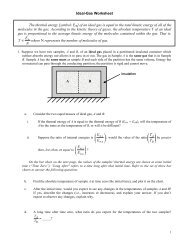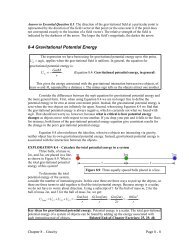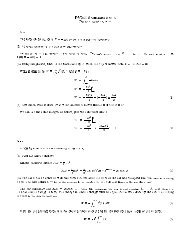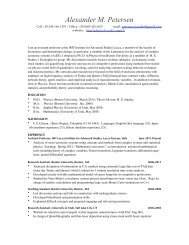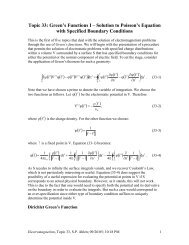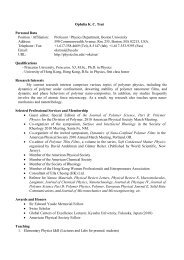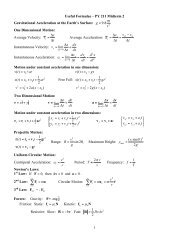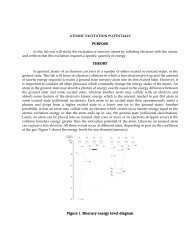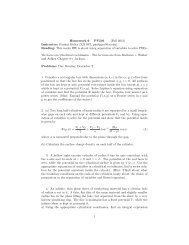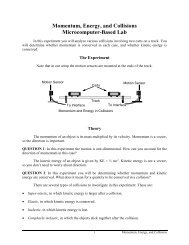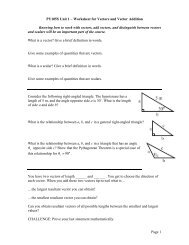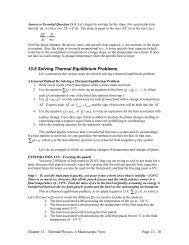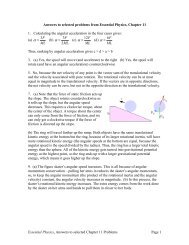Solving the time dependent Schrodinger equation
Solving the time dependent Schrodinger equation
Solving the time dependent Schrodinger equation
- No tags were found...
You also want an ePaper? Increase the reach of your titles
YUMPU automatically turns print PDFs into web optimized ePapers that Google loves.
Adding an external magnetic field For h>0, <strong>the</strong> average magnetization > 0 Simple change in <strong>the</strong> acceptance probability
Elements of a simulation program Module with: • system dimensions; n=l*l• pregenerated acceptance probabilities; pflip(-4:4)• spin array; spin(0:n-1)module systemvariablesimplicit noneinteger :: linteger :: nreal :: pflip(-4:4)integer, allocatable :: spin(:)end module systemvariables
Main program open(1,file='ising.in',status='old')read(1,*)lread(1,*)tempread(1,*)binsread(1,*)binstepsclose(1)call initialize(temp)do i=1,binstepscall mcstependdodo j=1,binscall resetdatasumsdo i=1,binstepscall mcstepcall measureenddocall writebindata(n,binsteps)enddo
Initialization tasks subroutine initialize(temp)use systemvariablesn=l*ldo i=-4,4,2pflip(i)=exp(-i*2./temp)enddocall random_seed(put=seed)allocate(spin(0:n-1))do i=0,n-1call random_number(r)spin(i)=2*int(2.*r)-1enddohere I-sum corresponds to jnumber spins i=0,…,n-1 No field (h=0). Small Modification for h>0 (see program on-line)jj
Performs one Monte Carlo step subroutine mcstep() do i=1,ncall random_number(r)s=int(r*n)spins are labeled s=0,…,n-1x=mod(s,l); y=s/ls1=spin(mod(x+1,l)+y*l)s2=spin(mod(x-1+l,l)+y*l)s3=spin(x+mod(y+1,l)*l)s4=spin(x+mod(y-1+l,l)*l)call random_number(r)if (r
Measures observables (energy, magnetization, and <strong>the</strong>ir squares) subroutine measurereal(8) :: enrg1,enrg2,magn1,magn2common/measurments/enrg1,enrg2,magn1,magn2 e=0; m=0do s=0,n-1x=mod(s,l); y=s/le=e-spin(s)*(spin(mod(x+1,l)+y*l))e=e-spin(s)*(spin(x+mod(y+1,l)*l))enddom=sum(spin)enrg1=enrg1+dble(e)enrg2=enrg2+dble(e)**2magn1=magn1+abs(m)magn2=magn2+dble(m)**2
Writes bin averages to a file subroutine writebindata(n,steps)real(8) :: enrg1,enrg2,magn1,magn2common/measurments/enrg1,enrg2,magn1,magn2open(1,file='bindata.dat',position='append')enrg1=enrg1/(dble(steps)*dble(n))enrg2=enrg2/(dble(steps)*dble(n)**2)magn1=magn1/(dble(steps)*dble(n))magn2=magn2/(dble(steps)*dble(n)**2)write(1,1)enrg1,enrg2,magn1,magn21 format(4f18.12)close(1)These bin data should be processed (giving final averages and statistical errors) with a separate program.
Squared magnetization for different system sizes (no external field): development of phase transition
Finite-size scaling T > T c : → 0 (exponentially) T = T c : → 0 (power law) T < T c : → constant > 0 Extracting an exponent: - Power-law: straight line when plotted on log-log scale


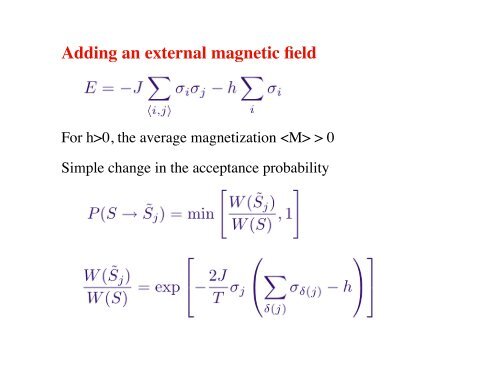
![arXiv:1303.7274v2 [physics.soc-ph] 27 Aug 2013 - Boston University ...](https://img.yumpu.com/51679664/1/190x245/arxiv13037274v2-physicssoc-ph-27-aug-2013-boston-university-.jpg?quality=85)
